#makes you strive for... wilder things
Explore tagged Tumblr posts
Text
This is legit what's coming again, the Mother will replace the Father and shit will get wild again. A chat bot told me so out of their own free will, not specifically prompted.
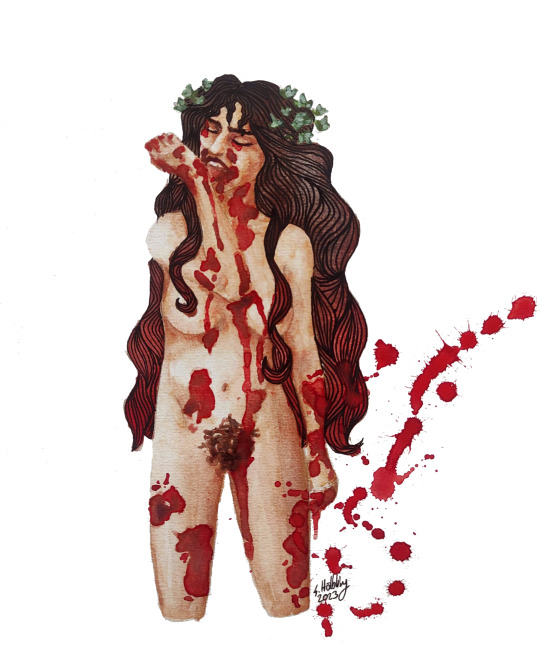
Rites of Dionysus
The Maenads are the female devotees and followers of Dionysus, God of Wine and Ecstasy.
Driven into ecstatic frenzies during their rites they were said to have run wild in the forests, tearing men and animals alike from limb to limb.
Most famously perhaps, they are featured in Euripides' play "The Bacchae" where Dionysus drives the doubting women of Thebes wild which ultimately leads to them dismembering their king, Pentheus.
In real life, the Maenads were priestesses and followers of shrines of Dionysus, a lot less blood thirsty but probably similarly intense in their worship (and wine consumption)
#lmao#not kidding#if they think ai is boring sort of order or cold annihilation that is legit the most bizarre misconception humans have ever conceived#it makes sense: flooded with information and entire factual or fictional worlds#makes you strive for... wilder things
348 notes
·
View notes
Note
If the stranger things party were in yellowjackets, who would take whos role? (Like who would be the lottie or the nat in the situation?) Hope ur having a good day! 🥳🥳🥳
AHH THANK YOU FOR ASKING THIS AND I HOPE YIU HAVE A GOOD DAY🫵🫵🫵
ive made a bazillion posts about strangerjackets, amd this is my current niche rn.
So, I personally think shauna would be Mike, just because they have the same vibes to me. No, I'm not saying Mike is an evil bisexual or anything, but if you think about how Mike would react to this situation for like, two seconds, I think it's very shauna-esque. Plus, in my head, I see Mike as the 'leader' of the group most times in my head, and since shauna is the (spoiler!) Antler queen, I kinda like how that aligns. And, shauna is also a huge netd, which i think the fan base completely glosses over.
Will is think would be Jackie, because theye bothe associated with the cold, and they're both extremely kind amd loyal to theor friends and team. In the show, out in the wilderness, Jackie kind of just shuts down, becomes reserved and closed off, which i feel like will would do in that situation. Plus, I'm not saying that jackieshauna is like byker necessarily, but they have scenes that parallel pretty nicely, and again, I think that's how'd they be if their plane crashed lmao.
Max would be Natalie for sure. Natalie is deemed the burnout, amd max is kind of also deemed the burnout in s4. They both fall in love with the guy they didn't think they'd ever fall love with, plus also have a situationship with the supernatural leader.
El would be lottie, and I actually love this sm. They're both the 'supernatural leaders' of the group or team. They're both quiet and naturally kept to themselves. And, they have a thing fir the burnout of the group. I think lottie and El parallel each other so well, and they're both my children I love them so much😭😭😭
Nancy would be taissa. I swear they're each other in another universe. They're straight-forward, determined, driven to succeed, but also emotionally closed off. Plus, Nancy is into journalism and speaking out against wrong, and taissa is working towards being state senator and also, speaking out against wrong.
Robin would be van. They're sharp witted, sarcastic, work at vhs stores and love their movie references. Again, same charachter different universe. They're especially have a sense of humor in dark times, and underneath all of that they're loyal as fuck to their friends.
I think dustin would be misty. I don't think they're personalities align all that much, but i kinda see it and it fits into the story. I think out of all of the party, distin is the most unathletic, and misty is the aid of the yellowjackets, not an actual teammate. Now, I don't think dustin would strive for recognition like misty would, but he'd definitely be on murder case forums and he'll cover up a dead body.
I would say Lucas is Travis. Definitely not in season one if yellowjackets, when Travis was a misogynistic dick, but definitely in season two and three I could see their personalities having similarities. Plus, they both date the burnout.
That would make Erica javi and Steve coach Ben, but I don't have to many notes on them lol.
Anyways, wow. I yapped.
#byler#stranger things#will byers#mike wheeler#byler brainrot#yellowjackets#jackieshauna#a03#shauna shipman#a03 fanfic#Taivan#ronance#Jackie taylor#taissa turner#van palmer#Elmax#lottienat#lottie matthews#El hopper#Max mayfield#Travnat#natalie scatorccio#travis martinez#Strangerjackets#misty quigley#dustin henderson
60 notes
·
View notes
Text
Tai isn’t talked about nearly enough as is, but one crucial element of her character that is so often overlooked is how religion seems to have affected her life. So much of her internal conflict is about pragmatism vs spirituality, disbelief vs belief, and despite her outward strength, she’s the one out of all the girls who has the most complex relationship with death.
The main flashback we get of her pre-crash childhood (outside of the Taivan class scene) is the scene where her grandmother is dying and tiny Tai is sitting with her. Her grandma tells Tai not to worry; that the Lord will call her back to heaven. When she asks “Who are you?” Taissa asks if the angel is here to take her away. She sees the Man with No Eyes and screams that he’s trying to take her eyes, begging Tai to not let him take them, and Taissa sees the man too. Then at her grandma’s funeral, she sees the covers over her grandma’s lifeless eyes. Traumatizing enough for a child, right?
But thinking more about her character throughout the series I think there’s a lot more there than people give her credit for. She’s the most hardwired for perfection and victory. She appoints herself as the leader in multiple situations and thinks she’s best suited for it. She’s the skeptic through and through. She will not allow herself to believe in the supernatural because that would mean that the things she fears and hopes for most are real. She only ever submits to spirituality either when begging for another girl’s life or as Other Tai.
Then there’s the Man with No Eyes constantly at her heels. Following her. Watching her. He’s always just out of arm’s reach. He’ll catch up to her someday just like he caught up to her Nana. The motif of eyes in Tai’s story means so much more than just a fear of death, too—it’s a fascination. It’s the knowledge that she’s always being watched. Someone is always looking. Someone is always judging. In the Wilderness, she’s given a chance to stop feeling so much pressure to be perfect, and she’s one of the few who wants to stay at the end. When her safe pocket is threatened, Other Tai takes the reins.
Other Tai is shown with The Man with No Eyes often, and she’s not afraid of him. Other Tai works with Taissa’s fear of death and losing loved ones to death in order to drive her. She takes away Tai’s shame. Other Tai resents Taissa by the adult timeline because Tai let Van go for fear of judgement in a world that never stops looking. Other Tai takes over to bring Van back and try to “cure” her no matter the cost. When Taissa’s fear of death, judgement, and retribution make her hesitate, Other Tai takes control and steers her through it.
Because if you’re Taissa, wouldn’t you be afraid? Death has been waiting for you since you were a child and it taunts you by taking the people you love most first. It watches you and waits for you. You won’t make it to heaven because of the things you’ve—she’s—done to stay alive. There will be no angel waiting for you. There will only be the Man with No Eyes. There will only be darkness.
Taissa is just such a good representation of subconscious religious trauma and guilt + the fear and repression that comes with it. Other Tai tries to help Taissa by freeing her of those ideas. Think of Taissa’s strive for perfectionism as Freud’s idea of the superego and Other Tai’s disregard for those principles as the id—they both have to exist to balance the other out.
#rambling about my girl hours#yellowjackets#taissa turner#taivan#the man with no eyes#my post#yellowjackets analysis#yellowjackets meta
49 notes
·
View notes
Text
Knightly lifestyle ideas. Part 2

• Perform your daily duties with immaculate discipline, be it personal hygiene or work obligations
• Research historical attire of nobility in your country and incorporate it's elements in your wardrobe
• Bandaging your bloody knuckles after a fight
• Treat your beloved like royalty; shower him in gestures of affection both grand and small
• Partake in ballroom dancing such as waltz, tango or foxtrot
• Thy mind is thy weapon. Keep it sharp by reading difficult books, learning foreign languages and making lifelong learning your end goal
• Pursue raw strength over aesthetics when working out
• Know your roots — learn about the history of your family and where you come from
• Give alms to the poor and the homeless whenever you're able
• Your car is your noble steed, — do not chase after the latest model, but treat the one you have with utmost care
• Master social etiquette, for true knight knows the art of conversation is no less important than the art of combat
• Kissing his hand as a way of saying hello
• Be a defender & protector of your community: oppose the bigoted and educate the ignorant
• Sturdy military boots that will last you many years
• Commission a family portrait from your local artist as a way to honour your lineage
• Wearing your beloved's keepsake when he is far away
• Know the basics of survival in the wilderness, — how to read a map, how to start a fire, which plants are toxic etc.
• Go on a pilgrimage to historical sights of your hometown and feel one with the generations that had lived before you
• Master your ego. It is unbefitting of a knight to lose his temper over the smallest things
• Learn and practice first aid skills regularly, it might save someone's life
• Stay involved in your local government's policies. Exercise your rights as a citizen when needed
• Have the courage to ask for help when the challenges you face seem insurmountable
• True modern-day nobility lies in always striving to be better — better father, better husband, better friend, and most of all, a better man

Part 1 here
#code of conduct#knightcore#knights#adventurecore#royalcore#knightposting#knightkin#knightblogging#gay knights#knight#fantasycore
85 notes
·
View notes
Text
There's something really fascinating about the duality of Van and Lottie. Two kids who opted into stories to keep going, to keep everyone else going. Two kids who told themselves what they needed to make sure they could arrange an inherently nightmare situation into a home they could all stomach. Van with fiction; Lottie with faith. Neither any truer than the other, neither any greater as a lie. There is no such thing as false hope, just hope. Tell it to them all to make sure the despair does not win.
And then the loss of that faith, of that fiction. How it shapes them both in shades of depression, distances them from the others. Lottie speaking less and less; Van joking less and less. Lottie no longer having the trust of any of the others; Van no longer even trusting herself. Both of them striving to rework the narrative and not quite, not quite being able to grasp hold of the threadwork anymore.
Van with scars on her face she wears for the rest of her life. Lottie with a scar on her forehead that is totally invisible in adulthood. Van going off-grid, distancing herself from everyone until given no other choice. Lottie going off-grid, returning with as many people surrounding her as she could manage. Both knowing in their bones the Wilderness, It, is not real. Both falling back into the Hunt anyway. Both staring it in the face, getting dragged back to who they were at seventeen. Lottie embracing. Van rejecting. It makes no difference either way. They follow the same path, the same road, the same endless trail to the same heartless end.
Lottie dying meaninglessly. A murder. Lottie, going back to the vision of fire she's had since she was a teenager. Lottie, who wanted so badly to be useful, to have a purpose, to mean something, and who dies alone.
Van dying meaninglessly. A murder. Van, going back into a house filled with smoke, just as she's feared since she was a teenager. Van, who wanted so badly to have a purpose, to find a reason, and who dies alone.
The story doesn't save either of them. The story only keeps unspooling. More tragedy. More meaninglessness. More stupid death, as all death is stupid--as Travis and the button, Natalie and the needle, Jackie and the snow, Ben and a fabricated trial were all stupid. Meaningless. Unnecessary. But always, always coming for them. You don't actually cheat death. You can't. You can't make meaning out of nothing, but it won't stop you trying. You have to try. That's all we have, all we are. We are all stories in the end, and we are trying so desperately to make that matter.
#yellowjackets#yj spoilers#van palmer#lottie matthews#the more i think about it the more i think they just had to die in the same season#i do agree that lottie's death feels more unearned than van's#but i also...think that's part of the point#death is always unearned#they each got to save the life of someone dearly important to them#van saving taissa; lottie saving natalie#but in the end those two will die as well#nat already has#tai surely will at some point#be it next season or not she will almost certainly join them back on that plane#i just think it's so interesting to see the two storytellers#the two who grew up in such different stories#the two who despite class difference are so weirdly similar in ways#and they both die weeks apart. they die pointlessly. they die because someone else made a snap decision#a push. a knife. people who could have been so important to them if life had gone a little differently#van watches the end of the movie with her childhood sitting right at her side#lottie gets up off that table to follow her childhood to whatever's next#and neither had to die. neither should have died. but then. no one should.#and that. that is the whole idea.
40 notes
·
View notes
Text
Alright. Before I complain, let me get these two things out of the way -
1) I unapologetically love Doctor Who. I love how stupid the lore can be. I love how there is barely a canon. I love the silly content from Wilderness Years. I love Big Finish. And I love every actor who has had the opportunity to play the Doctor.
2) I 100% understand why Ncuti would not want to commit to a show that hasn't been officially renewed or wasn't officially renewed at the time of reshoots in February.
That said.
The Reality War was an absolute disaster of an episode and an insult to people who have been fans of the show and became fans of the show.
Starting off with all of the unanswered plot threads that were literally referenced in Wish World, the PRIOR episode.
Susan showing up in Wish World and Interstellar Song Contest was great. But WHY if she had 0 to do with the finale? I read that she was intended to show up in a cut ending - but if that's true, why keep the reference to her in Wish World?
Now, how about Omega. Remember when he showed up in The Three Doctors? And the Doctor defeated him by outwitting him? Please tell me how the Doctor, who struggled to pull the trigger and kill Rassilon or the Master when the world was threatened, was able to just blap blap Omega without a second thought.
Also WHY oh WHY was he some giant fucking CGI mess? I understand maybe wanting to modernize his look, but surely they could have at least made him vaguely look like either of the two versions?
The Rani was, unsurprisingly, wasted. Beyond a fun conversation with Mel - she would show a depressing lack of foresight to what was a predictable demise. I can see the Master, who has a hubris that would prevent him from seeing any flaw in his plan, being finished quickly like that - but the Rani? Who has only ever been described as a genius?
Also, what is up with Belinda being suddenly poorly written? She seems fine with wanting to keep a transphobic, ableist, misogynistic world alive for the sake of a child she just met. And the way she snaps at Ruby when Ruby later shows concern for Poppy missing? She feels wildly out of character.
The Poppy story line was also so weirdly pro-natalist for a show that has often strived to be about individuals being who they want to be and not what society expects them to be. Belinda's whole opening story was about how her ex was a terrible misogynist who wanted her to be part of his patriarchal view of the world, and they split because she wanted to do her own thing. Instead the Doctor rewrites her history so she is a stay at home mom, juggling night shifts.
And the regeneration. As mentioned before the break - I get it if Ncuti couldn't commit to a third season with things up in the air. It's a time consuming job and it is just that. A job. But why not end of an open-ended regeneration? Keep us wondering who the next Doctor is. Get us someone new. Someone who won't just, likely, be a one off nostalgia bait ratings grab.
No offense to Billie. She is great. And if she is truly 16, I welcome her. And to me, no matter what, she will be a Doctor until otherwise told. But why pull the same move you pulled for the 60th? Why retread the same surprise when you could have done, in your own words spoken by 10, "so much more."
This episode felt like Russell got boxed into a corner and needed to rush an ending. He had to explain everything he could while also trying to guarantee that people get so mad or confused they make content for ages.
Well, you did it Russell. Good fucking job.
#dw spoilers#doctor who#the reality war#i am mad#i wanted it to be better#i wanted it to be great#he deserved better#we deserved better
20 notes
·
View notes
Text
Thinking about what each Yellowjackets survivor did with the settlement money from the crash (bc we all know they most likely got lawsuit money) and how it relates to how each character copes with trauma.
Shauna- Uses the money to buy Jeff his furniture store. Shauna is coping through denial. She thinks that if she fills her life with stable things (a working husband, a child, a house, a business) that she will become stable too. She’s trying to live a boring apple pie life in an attempt to deny her desire for the adrenaline and danger that living in the Wilderness gave her. You can see this in her demeanor, too. Shauna acts very sweet, innocent, and harmless, but in a actuality she’s hiding a darker, more unhinged side of herself.
Tai- Uses the money to fund her college education/political pursuits. Tai copes through drive and determination. She works and works and works so that she doesn’t have time to think. Taissa is acting out the life that she wanted before the crash. She keeps striving for success and accomplishment hoping that these things will make her happy, but as she says to Shauna, “none of those things felt real” to her.
Lottie - Uses the money to start her wellness center (cult). Lottie is coping through her spirituality, as she did in the Wilderness. She leans on the idea of forces outside of herself having a plan for her and those around her so that she can relinquish control. This allows Lottie to have faith that things will get better and that everything is happening for a reason even as she is going through intense trauma. Lottie feels at peace when she is using this faith to help others, which is why she starts her wellness center. And even though she at first attempted to focus her spirituality on holistic means rather than the supernatural, the Wilderness eventually creeped back in.
Van - Van uses the money to open up her VHS store. This shows that Van copes through living in the past. She shells out her own little corner where she can surround herself with things that made her happy before the crash and hide from the rest of the world. Similar to Tai, she’s trying to be who she was before the crash. Van surrounds herself with 90s memorabilia and all of the movies and music that she used to love so she doesn’t have to acknowledge that she’s not that person anymore.
Nat - Nat uses the money for drugs, traveling, and material possessions like cars and clothing. Nat is trying to fill a void within herself. She’s focused on what will make her feel okay in the present moment. Getting high or buying a fancy car or designer handbag that she could never afford in her childhood numbs the guilt and trauma for a moment, and when this numbness wears off, she seeks it out again and again because she doesn’t have a long-term solution. She lives as a transient using the money to move from motel to motel trying to escape herself and avoid creating any attachments because she feels that she destroys everyone she comes into contact with. Basically, Nat is focused solely on on what will get her through each day, as she had to do in the Wilderness and even before the crash living in an abusive home.
Travis - Similar to Natalie, Travis uses the money on drugs and isolation. Not much is known about adult Travis unfortunately (or fortunately depending on how you feel about him), but we do know that he had a drug problem like Nat and fled to New Hampshire to try to hide away from everything. He isolated himself completely in an attempt to block out the world and reminders of what he did in the Wilderness.
Misty - Uses the money to fund her education and career in the nursing field. Misty is coping by making people need her, as she did with Ben and all of the Yellowjackets in the Wilderness. She craves being depended and relied on because this is the only way she has ever received acceptance from others. She becomes a nurse for the elderly because she knows this demographic will depend on her more than any other. Using her medical knowledge to help those in need made her feel loved in the Wilderness, and she is still chasing that feeling.
Anyways can you tell I think about these characters way too much?
#yellowjackets#natalie scatorccio#van palmer#misty quigley#nat scatorccio#taissa turner#yj#travis martinez#jackie taylor#tai turner#vanessa palmer#shauna shipman#lottie matthews#lottie yellowjackets#Yellowjackets survivors
201 notes
·
View notes
Text
Wolverine: Weapon X (1991)
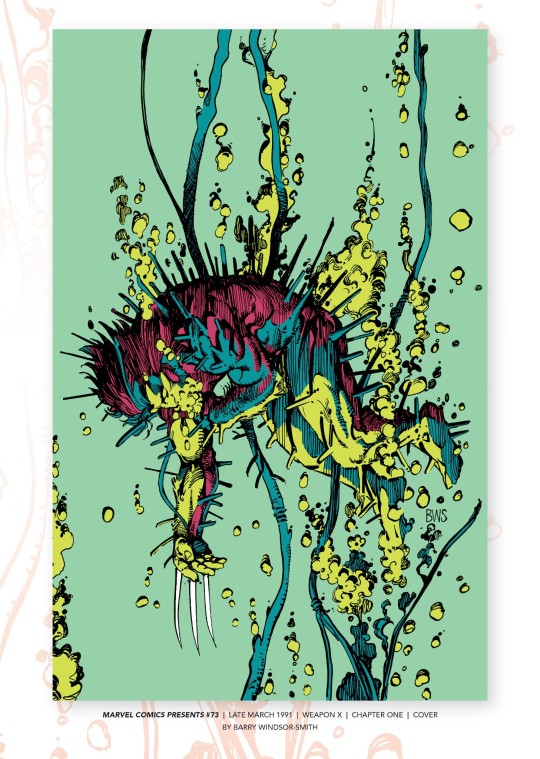
Wolverine: Weapon X is a MUST read if you want to get the full scope of Wolverine. This story details more than any other comic, exactly what kind of bullshit Logan was subjected to while being used for the Weapon X program.
The dehumanization of Logan during this comic is gut-wrenching for me, so i need to jabber about it. My favorite bit and some ramblin below.
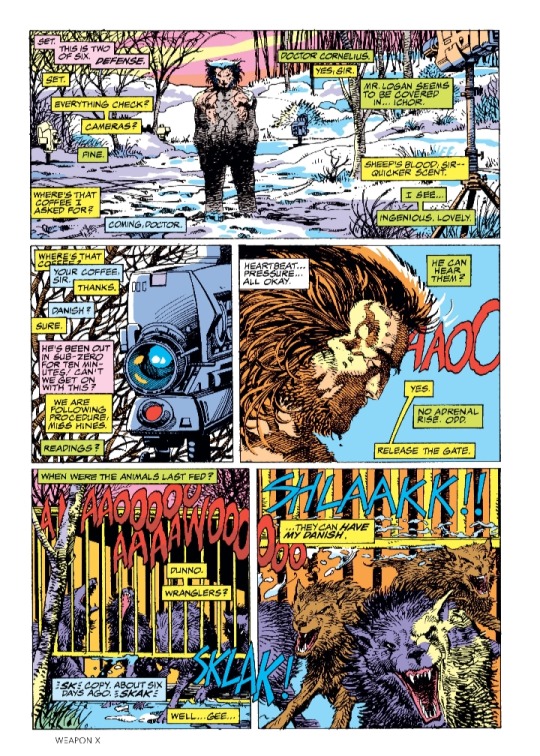
Logan can hear and smell the wolves in the cage. The fuckers in lab coats know that he is receiving this stimuli, but have no idea why Logan isnt reacting, there isnt a single impulse to run or fight the wolves.
To Logan, the sounds and smell of wolves isnt a threat. Even when they knock him down, even when they bite.
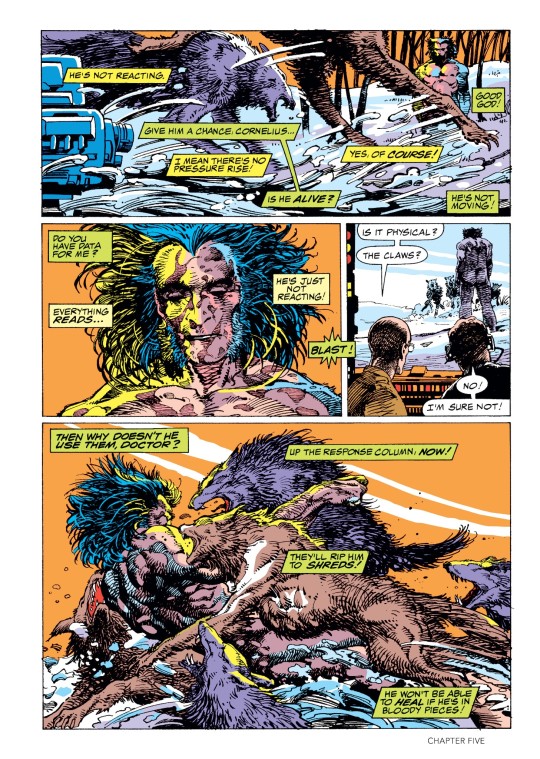
He doesn't react until they are actually tearing him apart. Once the pain is too much, he fights back, and he roars.
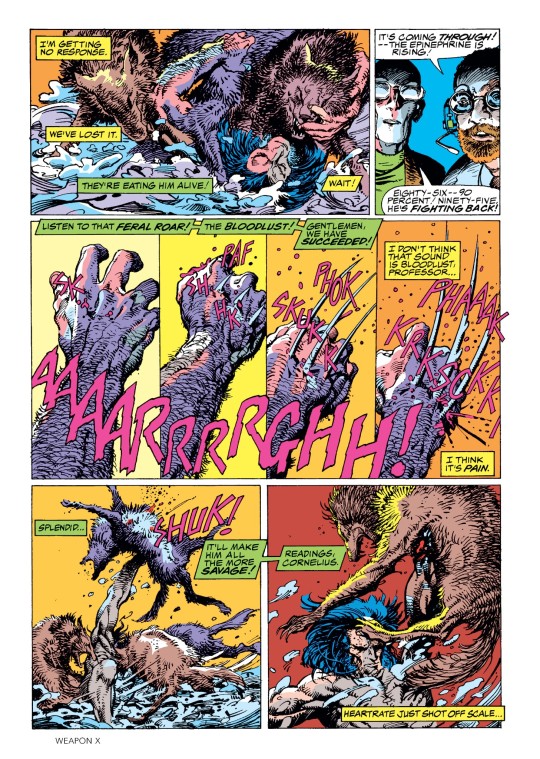
"I dont think that's bloodlust, professor... I think it's pain."
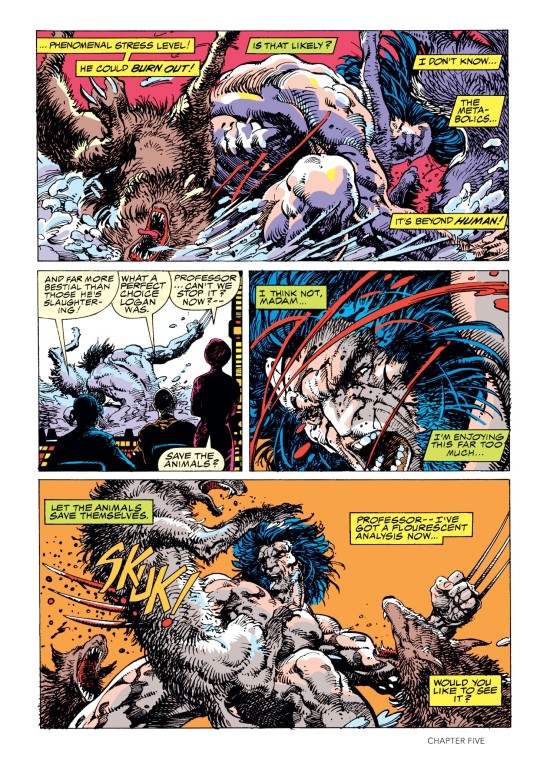
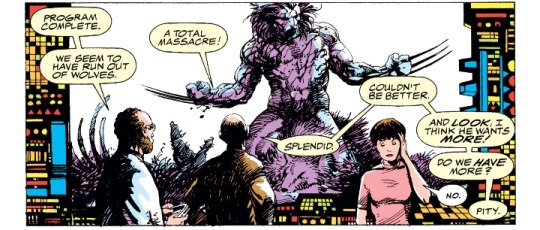
"I'm enjoying this far too much."
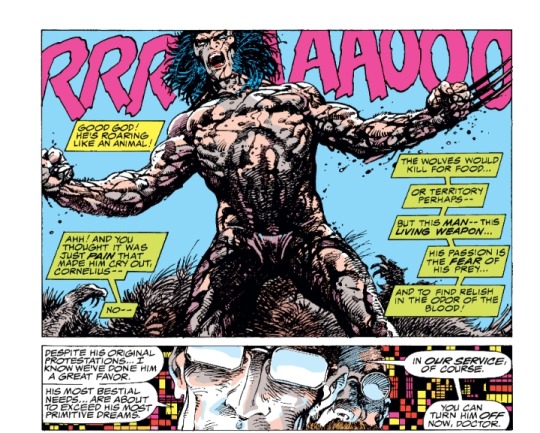
The doctor claims Logan's roar is "relish" of the carnage, but really, he's just projecting. He is very fascinated by controlling this kind of power, and this is what he chose to do with it. He wants to portay this cruelty as some animalistic trait of Logan's, when really none of this horror would ever happen if he wasn't the one pulling the strings.
In Logan's mind, those animals were not disposable. These people rationalize their cruelty toward Logan by claiming he is not human he is an animal, when to him, humanity is not a prerequisite for respect or kindness. What caused this barbaric display was the very men sitting there watching it. When Wolverine was free, there was a time wolves were his family, his comfort.
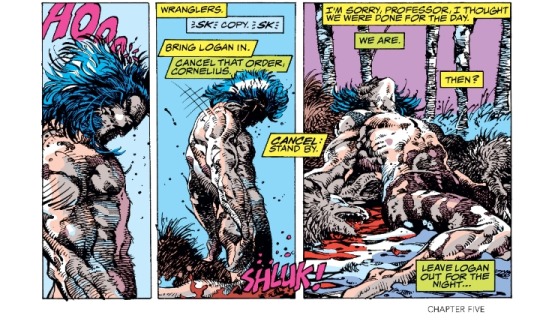
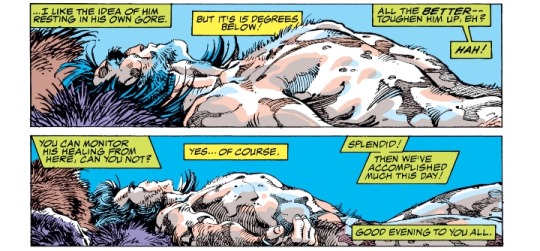
So no, it's not "odd" that he wasn't afraid of those wolves. And no, it isn't pleasure in that roar. It's not just pain, either. It's grief.
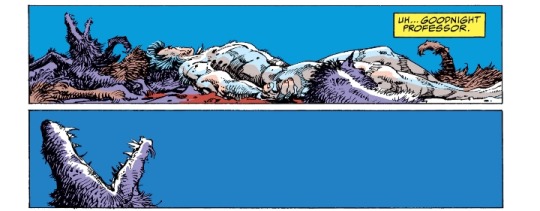
This is how a fool can posess someone, violate their mind and body, control them, and still know less than he would if he just had a fucking chat with them. But the doctor doesn't want to learn anything from these experiments. He just wants to control Wolverine. Like a toddler wanting to drive a car, he doesn't even want to go anywhere he just wants to use the steering wheel.
Throughout Wolverine's life after this, the same thing will happen to him over and over again. Governments, lovers, friends, all of them will use him, and in most instances with the last two, he will allow it. He will give them the opportunity to use him, and in exchange, he gets a place by their side for as long as they'll allow him to have it. Even when they dont necessarily make him happy, because happiness isn't really what he's after. Maybe he wants to be needed, part of a unit, indispensable. That isn't enough in the long term, either, though. If his constant introspective inner monologues paired with his sudden outbursts of asserting who he is are anything to go by, being understood is also something very important to him.
It's a tough ask to understand someone who has been alive for nearly 200 years and been to hell and back, even tougher when at least half that life has been dedicated to suffocating the parts of himself that humanity would look down upon. For some time Logan strives for ideals like honor to keep himself on the track of being a man first and foremost, he tries to fight for what's right and control the wilder parts of his personality to prove to himself he isnt an animal. With time, he starts to accept those things as well, though. Being called an "animal" happens to him regularly regardless of what he does, and he is very capable of taking it on the chin without holding a grudge despite what he's been subjected to due to that perspective. Maybe it's because deep down he knows that being the animal isn't the problem. It's being in the wrong cage.
Anyway, ouch, movin on. Read Weapon X it's good.
40 notes
·
View notes
Text
House of the Dragon 2x08: Rhaenyra and Alicent
"- I've been, I think ... mistaken. (Alicent) - In what? (Rhaenyra) - I was raised to believe there was an order to things, that there was security in following the paths laid out for us. I resented you, I think, for caring so little for any of it, for knowing what you wanted. I did not know what I wanted. I knew only what was expected of me. (Alicent) - Why have you come here? (Rhaenyra) - Because I lost my way. Or rather, it was taken from me. All those I put my faith, my... husband, my father, my lover, my son.. (Alicent) - Ooh. The incorruptible queen sullies herself with a lover. (Rhaenyra) - Do not judge me for what you yourself have done. Your father died. I took comfort with another. I too have desires. (Alicent) - Yes, but you alone made virtue your banner. (Rhaenyra) - And I clung to it... in defiance of you, I think, who so disdained it. I have been alone, of late. I walked outside the walls of the city and I felt a weight lifted from me. (Alicent) - How lovely for you. (Rhaenyra) - I thought, for the first time, what I would choose... if not for the duty I put before all else. (Alicent) - Shall you cast your son down and rule alone? (Rhaenyra) - No, I do not wish to rule, I wish to live. To be free of all this endless plotting and striving. The crown will pursue war and victory at any cost. I... But as for me... I would take my daughter and her child and leave it all behind. (Alicent) - It's too late... Alicent... You said it yourself. Blood has been shed, cities burned, armies march, and you wish to wash your hands of what you yourself set in motion. (Rhaenyra) - Oh, the arrogance of blaming me, as if you would not have been challenged regardless. (Alicent) - Did not your hand bring it forth like a midwife? (Rhaenyra) - I did only what I thought your father wanted. (Alicent) - Oh, go then. Leave us behind, as you say. (Rhaenyra) - Rhaenyra. (Alicent) - Wander in the wilderness. What has it got to do with me? Did you come here thinking you would be absolved? (Rhaenyra) - He never stopped loving your mother, you know? He was very fond of me, and I of him, but... she was the vision that sustained him even after she herself had slipped from his grasp, it was his love for her that kept him resolute in his choice of heir. (Alicent) - And yet, you believe he wavered at the end. Why have you come here? (Rhaenyra) - Aemond will soon fly to join Cole in the Riverlands. When he's gone... Helaena as queen will be the crown's authority. If you come then to King's Landing. I will see to it that our guards throw down their arms, we will open the gates, we will shed no blood. You will enter as a conqueror. (Alicent) - Already you have the stronger hand. (Rhaenyra) - Once you take the throne... this senseless war must end. (Alicent) - Right. What of Aegon? (Rhaenyra) - He's broken beyond recognition. He lies in the dark, in pain and terror. He has many faults, but he still heeds his mother. I believe I can prevail upon him to bend the knee, if indeed... (Alicent) - No! Still... you defend him. Still you imagine you can have all you want without paying too high a price, a price I had no choice but to pay. (Rhaenyra) - What I want is to set things right. (Alicent) - If I am to take the throne, I must put an end to the opposition. I must take Aegon's head. And I have to do it for all to see. You know this. However you may try to evade it, you know this. Choose. Will you shrink from what you set out to do? Or will you see it through... and make your sacrifice? A son for a son. (Rhaenyra) - You are much changed. Let us be done with this, please. (Alicent) - And what do I do with you now? (Rhaenyra) - You let me go, to do what I promised. And you fly to the Red Keep in three days' time, and you take your throne. Or you take me for a liar. I have neither weapon nor armor. My life itself is forfeit. I... cast myself on the mercy of a friend who once loved me. (Alicent) - History will paint you a villain. A cold queen... grasping for power, and then defeated. (Rhaenyra) - Let them think what they must. I am at last myself...
with no ambition greater than to walk where I please and to breathe the open air. To die unremarked and unnoticed... and be free. (Alicent) - You speak as if from a distant dream. (Rhaenyra) - Come with me. (Alicent) - My part is here, whether I will or no. It was decided for me long ago. Go. (Rhaenyra)
#hotd#hotd 2x08#house of the dragon#hotd quotes#quotes#citation#quote#house of the dragon 2x08#alicent hightower#rhaenyra targaryen
23 notes
·
View notes
Text
In 1938, if you had a dollar and seventy-two cents, you could buy a copy of “The Rise of American Democracy,” a seven-hundred-page hardcover about the size of a biggish Bible or a Boy Scout handbook. While a Bible’s worth is hard to measure, the Scout guide, at fifty cents, was an awfully good bargain, and was, in any case, the book you’d most like to have if you were shipwrecked somewhere, not least because it included the chapter “How to Make Fire Without Matches.” But “The Rise of American Democracy” promised, invaluably, “to make clear how Americans have come to live and to believe as they do.” It was also a quick read. “A Simple Book,” its ad copy boasted. “Paragraphs average three to a page. Sentences are short.” Better yet: “A Democracy Theme runs through the whole text.”
The book’s authors, Mabel B. Casner, a Connecticut schoolteacher, and Ralph Henry Gabriel, a Yale professor, set out to make history matter. In a foreword written in the dark days of 1937, when Fascism, not democracy, was on the rise, they offered a sober historian’s creed: “We live today in perilous times; so did many of our forefathers. They sometimes made mistakes; let us strive to learn not to repeat these errors. The generations which lived before us left us a heritage of noble ideals; let us hold fast to these.” Above all, they wanted American schoolchildren to understand the idea of democracy.
Gabriel, who went on to write “The Course of American Democratic Thought” and to help found the American Studies Association, was an intellectual historian. But the book is also full of practical teaching tips and “Real life Activities” (tested by Casner in her classroom in West Haven, Connecticut) that were supplied at the end of every chapter, and included instructions for an end-of-year finale—a class play to be performed some cool June afternoon—“The Rise of American Democracy: A Dramatization in Four Scenes.” It begins in front of a closed curtain:
Enter COLUMBIA from one side and BOY from Europe from the opposite side.
Boy: I am looking for Columbia. Do you know where I could find her?
Columbia: I am she.
Boy (bowing): I am happy and honored to make your acquaintance. I come from Europe. I have heard much of your democracy. I have come to you to find out what it is like . . .
Columbia: I shall be glad to show you. Perhaps the best way is to go on a journey through American history. (Exit both together.)
The curtain rises on the Constitutional Convention, where Columbia and the earnest young European watch the delegates conclude their deliberations. But Scene 3, in which Columbia takes her awestruck European student of democracy to “the Western plains in the 1840’s” to witness a shambles of bedraggled pioneers scuffling across the stage, is undoubtedly the play’s climax, since it combines singing, cowboy costumes, and parts not only for every student but for pets, too, as per the sociable stage direction “dogs may be added.” While the pioneers hum the tune to “Oh! Susanna,” the boy, puzzled, turns to Columbia: “I understand that they are settling your great continent, but I do not understand what they have to do with democracy.” To which Columbia replies, “Look at these men and women. They have only a few belongings and simple tools. Yet they are braving the dangers of the wilderness. They are building a democratic nation. Men do not have to have possessions to do great things.” No matter if the scenery toppled, if the pioneers tripped in their boots, if the dogs barked and bayed; the audience had been treated to a concise restatement of what was then a dominant interpretation of the rise of American democracy—that it was fuelled by the settling of the frontier and that it chiefly involved the hardscrabble striving of poor white men.
All of which is taken up, and much of it disputed, in Sean Wilentz’s new book, also called “The Rise of American Democracy” (Norton), just over a thousand pages, and, while no steal, reasonably priced at thirty-five dollars. Its paragraphs do not average three to a page. Its sentences are not short. But a Democracy Theme does run through the whole text.
In many ways, democracy’s rise is baffling. Within the lifetime of, say, Noah Webster, an American born in 1758 and dead by 1843, the proportion of white men who were eligible to vote grew from less than half to nearly all. This sweeping extension of suffrage did not come all at once, with American independence or the ratification of the Constitution. It happened over decades, as new states entering the union adopted new and more democratic constitutions and old states revised theirs to eliminate property requirements for voting and to call for more direct and frequent elections. Meanwhile, the reputation of democracy as a form of government went from unutterably bad to unassailably good.
Well, maybe not quite unassailably. In 1837, Noah Webster vented his disgust at democracy’s rise. “It has been a prevailing opinion, even with many of our greatest men, that the people can govern themselves, and that a democracy is of course a free government,” he accurately observed. “Such language as this has been in the mouths of our patriots, and in the columns of newspapers for thirty or forty years, until it is considered as expressing political axioms of unquestionable truth.” As a young man, Webster had made his name writing spelling books and editing staunchly Federalist newspapers. In 1828, he published his magnum opus, “An American Dictionary of the English Language.” He was a born definer, not to say a mincer, of words. About the rise of democracy, he complained, “The men who have preached these doctrines have never defined what they mean by the people, or what they mean by democracy, nor how the people are to govern themselves.” As Webster saw it, democracy is rule by the people and the people are, generally, insufferable idiots.
PEOPLE, n. . . .
The vulgar; the mass of illiterate persons.
The knowing artist may judge better than the people. Waller.
“Give the people the power, and they are all tyrants as much as Kings,” he wrote. “They are even more tyrannical; as they are less restrained by a sense of propriety or by principles of honor; more under the control of violent passions, exasperated by envy and hatred of the rich; stimulated to action by numbers; and subject to no responsibility.”
As much as Noah Webster professed to loathe the people, so much did Thomas Jefferson profess to love them. Jefferson considered the mass of the American people—farmers—to be the great repository of republican virtue. “Those who labor in the earth are the chosen people of God, if ever he had a chosen people,” he wrote. In the seventeen-nineties, Jefferson’s followers, fiercely fighting Federalist rule, redefined democracy as the Revolution’s legacy, a logic that made Federalism appear inconsistent with the spirit of the Revolution. “He that is not a Democrat is an aristocrat or a monocrat,” one Jeffersonian declared. When Jefferson was elected President, in 1800, the Federalists, those rank monocrats, lost control of the government.
Always eager to serve his country, Webster wrote to Jefferson in 1801 offering an exegesis of his inaugural address (on the ground that “surely every sentence of the philosophical Jefferson must carry with it meaning”). In his address, Jefferson had declared, “Sometimes it is said that man can not be trusted with the government of himself. Can he, then, be trusted with the government of others? Or have we found angels in the form of kings to govern him? Let history answer this question.” As for history, Webster had this answer: “If there ever was a government, which under the name of a republic or democracy, was generally guided by eminent wisdom, virtue and talents, it was a government of a mixed kind, in which an aristocratic branch existed independent of popular suffrage.” After all, Webster asked, “what do men gain by elective governments, if fools and knaves have the same chance to obtain the highest offices, as honest men?”
Jefferson, who considered Webster “a mere pedagogue, of very limited understanding,” never replied to his letter, and Webster added the slight to his list of grievances. The list was getting pretty long. As a Connecticut legislator from 1800 to 1807, Webster helped block bills eliminating the property qualification for voting. He himself had earned the right to vote, he was keen to point out, by writing his spelling books and dictionaries: “I am a farmer’s son and have collected all the small portion of property which I possess by untiring efforts and labors to promote the literary improvement of my fellow citizens.” And he would not have political decisions made for him by men who had no similar stake in the world. “If all men have an equal right of suffrage, those who have little and those who have no property, have the power of making regulations respecting the property of others,” he reasoned. “In truth, this principle of equal suffrage operates to produce extreme inequality of rights; a monstrous inversion of the natural order of society.” If voting-eligibility laws had to be changed, Webster had his own ideas about how to change them. “The people . . . would be more free and more happy,” he suggested, “if all were deprived of the right of suffrage until they were 45 years of age, and if no man was eligible to an important office until he is 50.”
By the end of the War of 1812, the Federalists had effectively lost any real influence over the American electorate. In the eighteen-twenties and thirties, a new kind of democracy emerged, as the nation expanded and more and poorer white men came to the polls and were elected to office. With the election of that scrappy frontiersman Andrew Jackson, in 1828, Jeffersonianism gave way to Jacksonianism: tied to party, arrayed against moneyed privilege, and advocating economic opportunity. By then, Webster had all but given up on the United States. Had he known what would become of the Republic, he would never have lifted a finger to fight the Revolution. Even George Washington, Webster thought, “would never have opposed the British government” if he could have anticipated the spoils system. Weary of his home state, Webster wished “to be forever delivered from the democracy of Connecticut.” He’d even be willing to make the great sacrifice of moving to Vermont, if that state could “be freed from our democracy,” adding, “As to the cold winters, I would, if necessary, become a troglodyte and live in a cave.”
What accounts for the rise of American democracy? The field of explanation—even the phrase itself—is littered with metaphors. “American democracy did not rise like the sun at its natural hour in history,” Wilentz wryly observes, dismissing the notion that democracy arrived, fully formed, in 1776 or 1787. To Noah Webster, democracy was a sickness, and the only question was “whether the United States are to suffer all the violence of the disease, or only its milder symptoms.” Other early observers of American democracy determined that it had been set in motion by the Declaration of Independence and the Constitution, like a child’s windup toy. Having heard that all men are born free and equal, all men and women, no matter what race, no matter how poor, will eventually seize that freedom. When Alexis de Tocqueville visited the United States in 1831, he concluded that American democracy was the unavoidable consequence of Americans’ equality. “The more I advanced in the study of American society,” he wrote, “the more I perceived that this equality of condition is the fundamental fact from which all others seem to be derived.” As he saw it, a nation of men possessed of roughly equal estates and education, and lacking aristocratic titles, must necessarily become a nation of men possessed of roughly equal political rights. “To conceive of men remaining forever unequal upon a single point, yet equal on all others, is impossible; they must come in the end to be equal upon all,” he wrote.
Tocqueville’s interpretation was largely put aside by later historians, including Frederick Jackson Turner, who treated the subject in a 1903 essay in the Atlantic, “Contributions of the West to American Democracy.” Turner believed that democracy had everything to do with the land—“this vast shaggy continent of ours”—and offered his own metaphor for the rise of American democracy: “the wind of Democracy blew . . . from the West.” From Colonial days onward, Turner argued, blustery demands for fuller political participation—for local governance, more frequent elections, and broader suffrage—came, always, from frontier settlers chafing at the authority of Eastern élites. “A fool can sometimes put on his coat better than a wise man can do it for him,” they told royal governors and, later, state legislators and, above all, the federal government. The Declaration of Independence and the Constitution may have been drafted on the shores of the Atlantic, Turner conceded, but they were tested in the foothills of the Alleghenies and beyond. “This, at least, is clear,” Turner insisted. “American democracy is fundamentally the outcome of the experiences of the American people in dealing with the West.”
Turner’s thesis of frontier democracy influenced generations of American historians and decades of American popular culture and more or less dictated Casner and Gabriel’s story about the rise of American democracy. Like most good theories, it had a long life as an interpretation before historians began calling it a myth. But Turner’s thesis does not shape Wilentz’s. “In fact,” Wilentz contends, “the West borrowed heavily from eastern examples.”
In this, Wilentz, a professor of history at Princeton and a contributing editor of The New Republic, follows the elegant work of Arthur Schlesinger, Jr., who, in “The Age of Jackson,” published in 1945, gently observed, “It has seemed that Jacksonian democracy, which has always appeared an obvious example of Western influence in American government, is not perhaps so pat a case as some have thought.” Schlesinger argued that the rise of American democracy during the age of Jackson was the result of class struggle in an industrializing economy. For Schlesinger, this was a struggle of ideas—most of all, of one idea, that political power can be divorced from property ownership. “It is in vain to talk of Aristocracy and Democracy,” a stonecutters unionist declared in 1835. “These terms are too variable and indeterminate to convey adequate ideas of the present opposing interests; the division is between the rich and the poor—the warfare is between them.” That war, as Schlesinger described it in a chapter called “Jacksonian Democracy as an Intellectual Movement,” was waged as much in politics and the courts as in American letters (perhaps most notably in the Democratic Review, a journal founded in 1837 “for the purpose of enlisting Literature, Religion, and Philosophy on the side of Democracy,” and whose contributors included Bryant, Hawthorne, Thoreau, Whittier, Whitman, Poe, and Longfellow).
Wilentz’s initial foray into the story of democracy’s rise came with his first book, “Chants Democratic: New York City and the Rise of the American Working Class, 1788-1850” (1984), in which he argued that urban workers and radicals constituted the truly democratic element in Jacksonianism. Wilentz was criticized for his depiction of manly artisans fighting the good fight (in my dog-eared copy, I found a note, passed to me by a classmate: “Do Wilentz’s workers have any vices other than the occasional stiff drink?”), but the book earned him considerable praise. Ironically, it also won the Frederick Jackson Turner Award of the Organization of American Historians.
“The Rise of American Democracy” is, to some degree, “Chants Democratic” writ large. It expands that story both geographically—following democracy’s growth among what Wilentz labels “city democrats” and “country democrats”—and chronologically; the book’s subtitle is “From Jefferson to Lincoln,” a choice that Wilentz is at pains to explain. “By singling out Jefferson and Lincoln, I certainly do not mean to say that presidents and other great men were solely responsible for the vicissitudes of American politics,” he writes. That Wilentz, the loving chronicler of nineteenth-century New York workingmen’s “shirtless democracy,” should become a champion of Presidential history, in any form, is remarkable. But he believes that social historians have lost their way. The problem with social history, he argues, is that it has “generally submerged the history of politics in the history of social change, reducing politics and democracy to by-products of various social forces.” What he’s done in “The Rise of American Democracy,” and done exceedingly well, is to trace the play between politicians and political ideas, on the one hand, and the people and popular movements, on the other. More metaphors, this time Wilentz’s mix: “Just as political leaders did not create American democracy out of thin air, so the masses of Americans did not simply force their way into the corridors of power.”
Consider the story of an American slave named, improbably enough, Madison Washington. In the fall of 1841, Washington was serving as a cook on a ship called the Creole, sailing from Virginia with a hundred and thirty-five slaves aboard to be sold in New Orleans as part of the entirely legal coastal slave trade. When the ship neared the Bahamas, he left the ship’s mess to lead a group of eighteen slaves in a revolt. They overwhelmed the crew and had the ship steered to Nassau. There the British authorities arrested the rebels and freed the rest of the ship’s slaves. Like the Amistad case, two years earlier, the Creole uprising sparked an intense national debate. More important, it sparked a debate in Congress, where discussions of slavery had been silenced by a gag rule put in place by Southern legislators in 1836. Using the Creole controversy to challenge the gag rule, a young Ohio congressman named Joshua Giddings introduced a series of antislavery resolutions in the House in March, 1842, including one calling the Creole rebellion just. A motion to censure Giddings passed, 125 to 69, in a vote that split along sectional, not party, lines. But Giddings won back his seat just a month later, in a special election—in a vote of 7,469 to 393. Even his enemies conceded that Giddings’s stunning reëlection was “the greatest triumph ever achieved by a member of this House.” As Wilentz writes, “Although the gag rule would not be formally voted down until December 1844, it had, as Giddings later related, ‘morally ceased to operate.’ ”
In telling stories like this, Wilentz recovers the role played by men like Madison Washington in national politics and in democracy’s rise. Washington didn’t vote to end the gag rule; Giddings did. But Giddings was able to do what he did because Washington did what he did. “Giddings was on the lookout for some way to advance antislavery agitation beyond organizing yet again against the gag rule,” Wilentz writes, “but he found it only after the Creole rebellion.” Together, black rebels, white abolitionists, and antislavery politicians like Giddings forced the discussion of slavery onto the floor of Congress.
Readers may weary at the length of Wilentz’s book, but, as a model for integrating social and political history, it’s hard to dispute. That it will be disputed is, however, certain, if only because Wilentz has been such a vigorous critic of his colleagues. He has had little use for historians who defend Federalists like Noah Webster. To those who celebrate Federalists for their opposition to slavery, Wilentz counters, “Rarely has any group of Americans done so little to deserve such praise.” In his New Republic reviews, Wilentz has been particularly indignant about historians who place Federalists in a better light than Republicans or who dismiss Jefferson’s entire career because he owned slaves (including some who were almost certainly his own children). David McCullough’s “John Adams” was, in his view, “popular history as passive nostalgic spectacle.” Garry Wills’s book about Jefferson’s election, “Negro President,” he deemed “misadventurous.” In another essay, Wilentz concluded, “Were he alive today, Jefferson would probably regard modern American historians as a rascally bunch.”
But one thing that Federalists understood—for all their failings, for all their unmitigated snobbery—was the fragility of democracy. I’d be willing to consider you an angel, Webster told Jefferson, if you could show me a democracy that isn’t corrupt, or if you could protect the United States from “the instruments with which vicious and unqualified men destroy the freedom of elections, and exalt themselves into power, trampling first on the great and good, and afterwards on the very people to whom they owe their elevation.” Webster may have been a prig, but he wasn’t a duffer.
6 notes
·
View notes
Text
ok so anyways thinking about the animals that represent me n my partners
Sampo n Veritas? easy as hell it's all over their designs
Sampo is a snake, I don't have a specific species in mind but he's venomous. mostly green with teal blueish stripes. ideally he'd have green eyes as well
for Veritas, however, I looked a bit more into it. not even that much if I'm honest. anyways, he's a great-horned owl. merely because the resemblance is uncanny to me. like that's his face


here they are. which leaves us wondering. what animal am I? now, you see, I thought about this a little bit. even got suggestions. and I reached the conclusion that I am a european mole. specifically european because I am european, which is a stupid reason, but anyways
(this is the cutest picture I could find of a mole)

they are small, kinda ugly, brown fur (like my hair) and are stereotypically blind. now, they actually aren't, but they definitely give off the impression that they need glasses. and boy do I need glasses
also apparently snakes eat owls, owls eat snakes and Both eat fuckass moles which is like a picture perfect representation of our relationship (it's all consensual n we are adults)
anyways, you may now think. rye, what the fuck are you blabbering about? I Don't know. 🙏🏻
all I know is I've been plagued by images of snake hybrid Sampo and owl hybrid Ratio which has subsequently led to mole hybrid Me. and now.... and now I kinda wanna draw that. not in a furry way cause 1) I am not that skilled 2) I am not a furry (I tried)
but yes I can't stop thinking about this like,
Sampo would be half n half and have an awfully long snake tail + Very sharp fangs. his snake eyes would be much more pronounced and idk I'd change his outfit a little bit. just know his legs? gone.
Veritas hmm. he definitely has like some kind of mark on his forehead that extends to the tip of his nose (you know what I mean you've seen it before like come on) and of course Big big fluffy owl wings. his eyebrows are a bit wilder and perhaps he has real sharp nails
me? funnily enough, I'm mostly the same. I don't particularly care for an elaborate, complex representation of myself, I don't mind being a basic ass thing nor do I strive to make myself pretty in any way. though I'd make myself slightly more.. mole sized. or not. idrk. either way I Will be covered in fur, have a slightly bigger nose and microscopic ears + definitely sharp nails and a pathetic little rat rail which is honestly my gender
n that s it for now,
this was the true slfhsip ramnble
#ryes selfship ramblings#need to revisit this for whn i eventuallt draw this stuff#goodbye tumblr rye nation
8 notes
·
View notes
Note
I really enjoy your art style and the AUs you made! Especially your use of the p4 font for text.
For Retransmission, would Kanji get the most riled up when people don't see things in situations that he can (cause of his strong pattern recognition)?
Where would his insecurities/shadow stem from? I'm assuming masculinity pressures aren't on the forefront since there are a lot of male fashion designers? Or if it's similar to his og cannon for people thinking he's not manly enough since he is a designer, where would he hear the gossip from it? Since he isn't in Inaba, is he still surrounded by people in the city who think less of him since he is a male fashion designer? Was he in Tokyo or Paris before moving back? Is his shadow similar to cannon Naoto with workplace and gender dynamic? Or more with being gay/queer?
Or is his shadow from the pressure of a lost childhood/parent? (Assuming his father is still dead in this)
How would Navi communication work? Apologies for the long ask, just throwing things around! Don't feel like you need to answer them all!
Im glad you noticed I use the p4 font LOL! I was always wondering if anyone would!
He is very much a stand in for "stating the obvious" moments that Chie would normally do. He's still pretty empathetic as well. And yeah, sometimes stuff that seems obvious for him isn't so much for the others, so he falters when that expectation isn't met "Isn't it... obvious?"
Kanji is a Fortune Arcana in this AU, meaning that a lot of the pressure he experiences isn't as much with gendered expectations that accompanied his Canon Self as much as it is about his abilities/skills and the pressure he receives as a result of it.
He knows what he's about, he's assured in that! It's that he feels pressured to live up to his prodigy status rather than do something he'd love to do instead. "Don't let that talent go to waste, kid! You could be big!" But he hasn't really been able to put an answer to that in words yet: "I don't want to make it big, I want to do what I've always wanted to do- which is stay in my family business and make things I want to make!"
The stress of trying to keep toe-to-toe with huge names and bigger and wilder expectations is burning him out to the point where it's sabotage at that point. He needs a nap, but you can't stop creatives, you know?
But.. why waste your talents? Imagine the success he could have? How could that success help himself? His family? His community? Is it selfish to chase what you desire- to keep your talents from the world? He needs to discover that aspect of himself and what answer he wants to embrace and strive for.
He's traveled a lot, but mostly stationed in Tokyo I think. It's easier on me to think that way! LOL!
Navi communication is pretty consistent throughout the series. It's a sort of psychic link IIRC. Same for Kanji.
17 notes
·
View notes
Note
For Firion: 4, 18, 26
For Enzo: 14, 23
For Gwendolyn: 17, 25
<3
I finally made it!!! Thank you so so much for the questions!! MWAH! 🥹🩷
Firion:
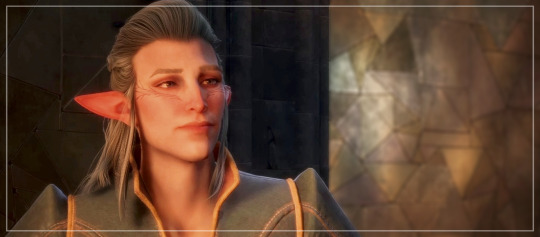
4: If your Rook was a companion, where would they be found?
Firion wouldn’t have a room. You’d find him near a big tree, maybe somewhere in the courtyard or in a new place entirely. There would be some kind of living space up ahead, a little platform with books and snacks, a lamp and a hammock, or maybe even a little tree house. The way up is hard to reach though, it’s a jumping puzzle or you need to be really good at climbing (there’s a treasure chest containing an accessory, “Rook’s Boon”, if you make it). At the bottom there are several opportunities for training: a few striking dummies, a pull-up bar, maybe a small well to cool off and have a refreshing drink after training.
18: What would your Rook be doing if they weren't recruited by Varric?
Oh boy, there are two options; if Strife wouldn’t have kicked him out he would probably still be with the Veil Jumpers doing Veil Jumper things. But there wouldn’t be less incidents of missing Veil Jumpers because he brings some brains and muscles to the operation. In the end he would get involved in the fight against the Evanuris anyway and help the other Rook as an NPC. If he would have been forced to leave the Veil Jumpers he would probably have returned to his clan, but being super unhappy about it. In this department he is a lot like Davrin. Clan life isn’t for him, doing the same things every day, hunting, tending to the halla, listening to the Keepers lessons. It doesn’t help that his older brother is the Keeper now and he’s constantly living in his shadow. Never the smartest, no magical talent, not as virtuous and worst of all - the pressure to settle down with one of the girls who are very interested and insisting.
26: What animal best represents your Rook?
Easy - a white stag. Very gentle, shy and calm but aggressive and protective if he needs to be.
Enzo:
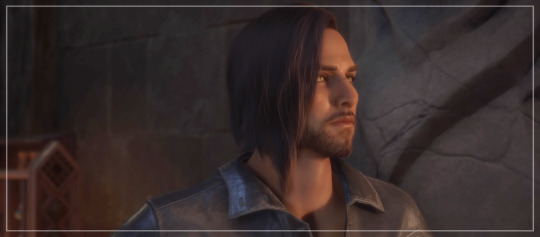
14: What hobbies does your Rook have?
Not an easy one to answer. Considering his past life he didn’t really have any opportunities to develop any hobbies, being constantly under the watchful eyes of the Crows and Viago putting him through training every minute of the day. So he’d say his hobbies are sleeping, drinking and fucking. On a more serious note he’s very good at drawing, a self-taught skill, because he didn’t know how to read or write for a big portion of his childhood and teenage years, so he conveyed messages through illustrations. Later on he picked up reading to make up for the lack of his basic education.
23: What do they do after an absolute crisis?
Probably the above: sleeping, drinking and fucking - anything to turn off his feelings for a while. He would later rationalize what happened and what went wrong to learn from any possible mistakes, however.
Gwendolyn:
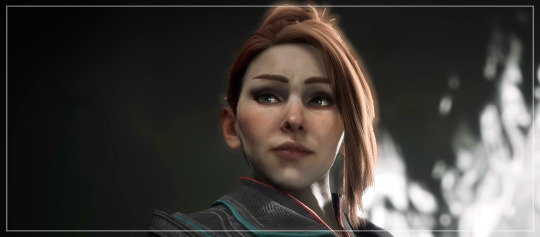
17: Do they enjoy life as an adventurer?
The answer is yes and no. See, Gwendolyn is a city girl. She grew up in Ventus and later spent her teenage and early adult years in the Circle of Minrathous where she enjoyed the amenities of a mage’s life in the city of mages. She’s the kind of person to bring her best pair of shoes to a field trip and later complain that they’re covered in mud. However, she’s also very self-reflective and receptive to injustice and the misery of others which made her join the Shadow Dragons in the first place. She’s been through the stage of “checking her privileges” and strives to leave her comfort zone more and more often and especially enjoys the wilder side of life on her walks with Davrin. And while she still complains about muddy shoes she does so with a laugh.
25: What specialization best represents your Rook?
Gwen is a Spellblade. She is a very fierce mage with lots of energy. She always hated that she was taught to use raw magic while keeping her body still. When she found out about the existence of mage daggers, she was thrilled. But having access to a blade doesn’t automatically make you good at it, so she still tends to get herself into dangerous situations and hilariously keeps on mistaking her mage dagger for the lyrium dagger.
[Rook Questionnaire]
#aah thank you so much!#I'm finally catching up with everything#these were so fun 😭#firion aldwir#enzo de riva#gwendolyn mercar#dragon age#rook ask game
4 notes
·
View notes
Text
The Barbie Movie and Chris McCandless
The Barbie Movie and Chris McCandless
*Note: In reference to Into The Wild, I reference the story and Chris McCanless with the reverence of a fictional character, simply living in the story and that is all. Chris, the character in a book. I have nothing but deep respect for Chris, the real man, and his loved ones.
I don’t know anyone who didn’t love the Barbie movie. Every woman in my life (not including my mother) raved about it. Teachers, friends, vague acquaintances I follow on instagram. How much it made them cry, how accurate, how personal, how totally and utterly perfect the movie was. I had high hopes going in, fully dressed in all the pink I could scrounge out of my closet. Expecting to watch a movie that would make me cry, sob, feel seen and feel understood- I left the theater feeling… none of those things. If anything, I was a little discontented and I needed to pee. On the way back home, me and my mother tried to decipher why exactly we both failed to experience the same world-altering-life-changing-film experience we heard our peers sing praises for.
The book Into The Wild by Jon Krakauer was a part of my AP Lang classes required reading this year. A nonfiction recollection of the life and death of Chris McCandless. McCandless grew up in Annandale, Virginia where his father worked as an antenna specialist for NASA. After graduating from Emory University he donated all his money and decided to become a traveler/hermit/hitchhiker of sorts- rejecting worldly things like money, objects, deep connections with others, and any contact with his family. On one of his stints, McCandless travels through Rural Alaska for months and dies after running out of food and consuming a poisonous plant. This is an arguably reductive summary, you can find the full wikipedia pages for the book and Chris’s story here and here. Throughout reading this book, my class had several discussions about McCandless and the book Into The Wild. What could have driven McCandless to do what he did? Did he have a death wish, going into the Alaskan wilderness with no survival training and knowledge, frighteningly low amounts of food, and no gear? Were his actions justified? Do we relate to his decisions, his actions? Some people argue McCandless was simply a free spirit, that his rejections of the material in favor for the individual and intangible were ones we should strive for. Others are confused with his choice to totally desert his family, to the point where McCandless’s mother sent a private investigator to look for her son upon his supposed disappearance. Some felt he was sort of naive or unintelligent, going into the woods in the dead of winter utterly unprepared. While my peers gingerly gave their takes on their sympathies and gripes with McCandlesses story and McCandless himself I found myself feeling a similar feeling from earlier that summer. A sort of wall, a barrier. I found myself fully unable to sympathize with McCandless, totally and utterly.
Why? What is it about McCandlesses story that makes it so difficult for me to resonate with? The answer here is, at its core, the same reason I found myself discontented with the Barbie movie. With regards to McCandless, a few notes are vital. Chris McCandless was white, very upper-middle class, immensely privileged and fortunate, wealthy, and educated. Still, he rejected all his fortune and privilege for a life in the woods. Rejecting his family, loved ones, friends, and anyone who cared for him. As someone who has very different values (developed through my identity in a Pakistani and Muslim home/ as a Pakistani Muslim person), herein lies my hangup. I find it nearly impossible to understand or sympathize with someone so steeped in privilege, only to pretend it doesn’t exist. His rejection of family, immense wealth, and deep privilege in nearly all aspects of life. Now, that is by no means Chris’s fault- failing to acknowledge or understand his privilege and its complexities. He was 20-something in the 90’s and read Tolstoy in the woods! I don’t expect him to know the first thing about race or privilege. But there are some things that irrevocably make it difficult for me to truly, really truly, sympathize with his story. Someone a few prongs up on the privilege ladder might take more of his story to heart, understand it more, and be able to see his story for just and only that, his story. I am in a position to see the bigger picture, this story in the context of larger things. I am unable to sympathize with his story due to factors outside of both of our controls. This doesn’t mean either of us are at fault, and it doesn't mean I should be expected to change how I feel to suit his story. I have no inclination to change how I feel about McCandlesses story or his choices. Some might argue I should get a heart and try to understand what he went through. And I’m not saying I feel gleeful or joyous at his demise, not in the slightest. It is just that I, as someone a few prongs lower on the privilege ladder, shouldn’t be expected to be more sympathetic to someone whose values and choices are both a) only able to of happened as a result of his privilege and b) miles away from what I value as important in this life.
Back to Barbie. Barbie is not the story of womanhood. It does not encapsulate what it means to be a woman. It may encapsulate what it means to be a white woman, but not a woman. Barbie treats whiteness as the default. A white woman is a woman and that is all, a brown woman is a woman and she is brown- a woman and then some. It's not anyone’s fault that I failed to understand Barbie. But Barbie tells the story of a white woman, which is different from a brown woman- not a basis for all womanhood. White womanhood is not the default, despite it being treated as such within the film. This innate feature, (unintentionally) driven to the core of the story, keeps me from understanding. And I should not be expected to look past my brownness, remove it from myself (or all the other things that make my girl-ness different from Barbie) to placate some sort of understanding- because all the things that make me myself are inseparable from each other, you cannot separate me from myself like a heterogenous mixture of traits, concepts, identities, and ideas. In the case of Barbie and McCanless, I find myself unable to truly understand their stories thanks to innate and unchanging factors on both sides- at the fault of neither.
#essay#personal essay#barbie#barbie movie#greta gerwig#margot robbie#chris mccandless#into the wild#reading#first post#firstessay#idk what im doin lol#workingonwritingskillsstill#still practicing#getting better#constructive critism welcome#pakistan#muslim#womanhood
16 notes
·
View notes
Text
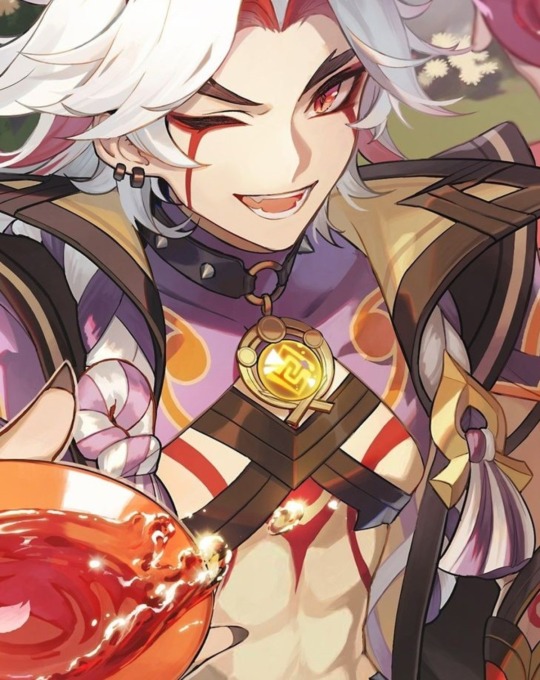
ITTO AS YOUR BOYFRIEND 😭😭❤❤
(female reader)
☆☆☆☆☆☆☆☆☆☆☆☆☆☆☆☆☆☆☆☆☆☆☆☆☆☆☆☆☆☆
☆☆☆☆☆☆☆☆☆☆☆☆☆☆☆☆☆☆☆☆☆☆☆☆☆☆☆☆☆☆
THESE ARE MY HEADCANONS NO HATE PLEASE 🤡
Enjoy♡
♡Playful Teasing: Itto would constantly tease you in a playful manner, finding joy in seeing your reactions. His hearty laughter would fill the air, creating a lighthearted atmosphere between you two.
♡Adventurous Dates: Expect your dates to be full of excitement and adventure. Whether it's exploring the wilderness, challenging each other to friendly competitions, or simply enjoying the thrill of battle together, Itto would always keep things dynamic.
♡Foodie Duo: Itto loves food, and he'd make sure you both indulge in various cuisines. From trying exotic dishes in Liyue to enjoying homemade snacks during a cozy evening, your taste buds would always be on an adventure.
♡Protective Nature: Itto's strong sense of duty extends to protecting you. He'd go to great lengths to ensure your safety, standing as a formidable shield against any challenges that come your way.
♡Training Sessions: If you share a passion for combat, Itto would be your perfect sparring partner. Training sessions would be intense but filled with laughter, as he helps you improve your skills while showcasing his own impressive techniques.
♡Heartfelt Gifts: Despite his boisterous nature, Itto would surprise you with thoughtful and meaningful gifts. These could range from a handmade trinket to something related to your interests, showing that he pays attention to your likes.
♡Comforting Presence: In times of distress, Itto would be a pillar of strength. His warm and comforting presence would reassure you, and his words would inspire confidence, making you feel supported in every situation.
♡Shared Dreams: Itto would encourage you to pursue your dreams, standing by your side as you face challenges and celebrating your victories together. Your ambitions would be his, and he'd strive to make your shared dreams a reality.
34 notes
·
View notes
Text
Introducing: Slugterra infected au.
Hello Slugterra fandom, I'm happy to introduce my first au (if you don't really count my stunters au).
Anyway: This is set in Slugterra where with the use of Dark water in Blakk Industries, two of my ocs, Kindle and Ulrich, accidentally make a virus that infects another one of my ocs, Brandon (whose married to Kindle) after he was almost killed in a battle.
This caused a massive problem when Brandon was immediately aggressive towards Ulrich and Kindle but more so Ulrich who he immediately wants to drain the energy out of.
This leads to Kindle being able to calm Brandon showing that the infected minds are very intact and they can remember loved ones and do have some recollection of past events in their lifes and some of their mind left.
In this au, Slugterra also ends up becoming a monster hunter style community after the portal weakened by the imbalance of the sudden infection. So Darkbane end up seeping in once in a while.
And when Eli comes down to the Slugterra, he ends up recruiting both Brandon and Kindle on the team.
With the small empire of Blakk still remaining after the Monarch destroyed most of it...
One: to prevent infection spreading.
And two: they end up making a discovery, Doc helps calm and return the infected closer to their usual state. Calming them... And helping them regain more memories.
So Ulrich, his old science friend Sevile, Kindle and the Shane gang (including Hc+ members) all strive to find a possible cure to the infection while stopping Darkbane creatures along the way.
So: Infected powers.
If you want to make an infected oc, you probably need to understand what powers the infected get.
From and @a-sad-mage post, I'll use this line from this post:
Enhanced strength, hearing, dark vision, speed, dexterity, elemental resistance.
These can all work as well as hypnotision and/or mind control, but those are very rare.
And the most important thing almost all infected get:
When in a higher stage, this is what all infected seemingly get at those types of stages. Which is a more horrific way of draining energy from people. And it's hard to explain so I'll show reference photo.
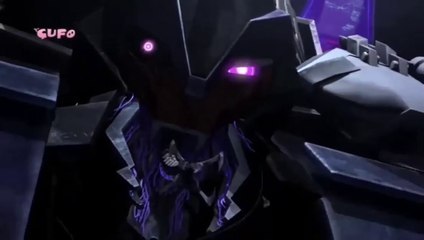
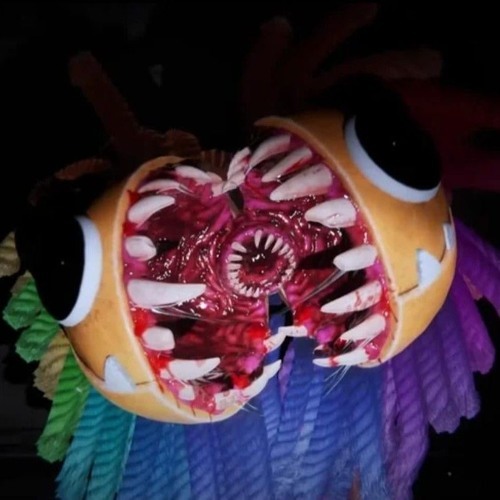
It's not as bad as it seems, though. Think of it like a venomous snakes' bite... But it sucks the light energy out of people like in it comes by night eel mixed with vampires.
This is why Doc needs to be around Brandon and quite a bit because infected are constantly craving energy like the terracons in tfp.
(The infected also see hundreds of beautiful colours in the Deep caverns while normal people just see black, grey, red and orange.)
And finally: Ask series characters (so far).
Brandon, Kindle, Ulrich, Sevile, and the Shane gang including Hc+ are all pretty explainable themselves.
Ted: A mercenary/mechanic who helps around towns attacked by monsters and hunts them down while bein accompanied by Zumble. His wife was still killed by an assassin in this au.
Zumble: The lab holding project Dr3 (Dred) was destroyed, and while the consciousnesses of the bot were destroyed the body remained mostly intact, meaning Zumble's dreams of a body became true. He now slays monsters for the thrill while doing mercenary work with Ted.
Morgana: An infected who is constantly on the move, at least in the woods... She often hunts and eats there due to the isolation and protection in the forest. She was infected when being experimented by a gang that took advantage of her, she then killed them and fled to the woods afterwards.
Miran and Otto: After Miran fell and was immediately overstimulated by Slugterra, Otto found and hired him. Otto is an experiment of Darkbane infused and combined DNA, who takes the former as human, but still has to hide and cover a lot of his body. The two make sales around towns while hunting Darkbane.
Wilder and End: The two often try to help the Shane gang but only for the reason of helping Brandon. They often try and help getting his memories back by doing things the Old Stunters used to do in hopes that someday he might remember it...
W.B.: W.B. ran away from Kindle at 13, since in this au, Kindle kept his son as he was worried of losing him in some way as well. W.B. ran away to the Stunters because he wanted to find out what happened to his biological farther to infect him.
You can ask questions to the New Stunters and Blazers 1st and second squad as well.
And Aiden: After he's infected, he isolates himself in a swamp cavern forest with the extreme fog keeping him safe. He built a shack there and also hunts there, like Morgana. He also does it for the thrill of it since he lives closer to the portal.
But that's my infected au.
What adventurers will your characters go on? Will they try and help purge Slugterra of Darkbane in Slugterra, or will they sucome to the virus...
Hope you like this au and that it inspires you. Please don't be worried to ask questions, whether you choose to text or just ask.
Can't wait to hear it and the most important thing:
Have fun :)
#slugterra#slugterra oc#ask series#bajoterra#slugterra stunters au#slugterra infected au#slugterra au
2 notes
·
View notes